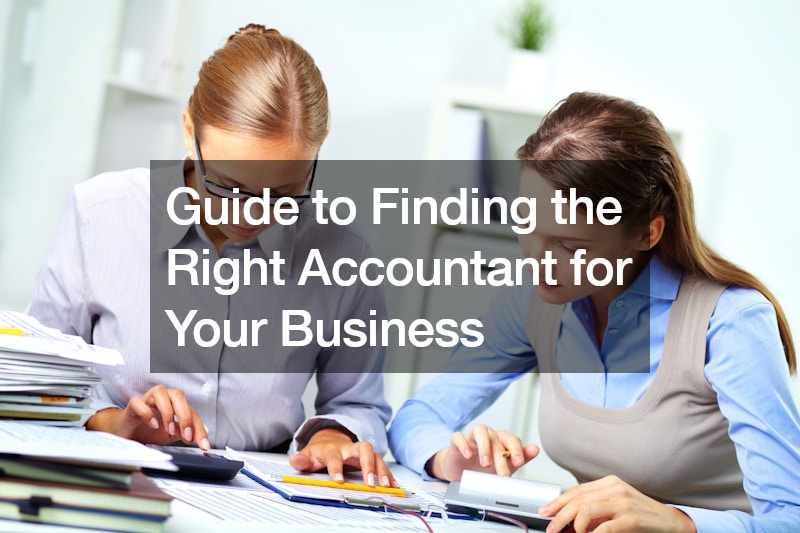In the complex world of business finance, having the right accountant can make all the difference. Whether you’re a small startup or a large corporation, the expertise of a skilled accountant is indispensable. However, finding the perfect fit for your business can be a daunting task. In this guide, we’ll explore the essential steps to help you find the right accountant to meet your business needs.
Understand Your Business Needs
Before embarking on the search for an accountant, it’s crucial to have a clear understanding of your business needs.
Determine the scope of services you require, whether it’s bookkeeping, tax preparation, financial analysis, or strategic planning. Assess your current financial situation and future goals to identify the specific skills and expertise your accountant should possess.
Define Your Budget
Budget considerations are paramount when hiring an accountant. Determine how much you’re willing to invest in accounting services and ensure that the fees align with your budget. Remember that cost is important but it’s not the only factor to consider. Consider the value and expertise that the accountant brings to the table and weigh it against the cost.
Seek Recommendations
One of the most effective ways to find a reliable accountant is through recommendations from trusted sources. Reach out to fellow business owners, colleagues, or industry peers for referrals. Additionally, consider seeking recommendations from finance and accountancy recruitment specialists who have expertise in matching businesses with qualified accounting professionals. Their insights and networks can be invaluable in finding the right candidate.
Check Credentials and Experience
When evaluating potential accountants, it’s essential to verify their credentials and experience. Look for certified public accountants (CPAs) who have undergone rigorous training and adhere to professional standards. Assess their experience working with businesses similar to yours and inquire about their track record of success.
Evaluate Communication and Compatibility
Effective communication is important when working with your accountant. A good accountant can explain complex financial concepts in a clear and concise manner and who is responsive to your inquiries. Additionally, consider compatibility and cultural fit. You’ll be working closely with your accountant, so it’s important to choose someone you feel comfortable with and who shares your values and vision for your business.
Assess Technology Proficiency
In today’s digital age, technology plays a vital role in accounting and finance. Ensure that the accountant you choose is proficient in accounting software and other relevant technologies. Familiarity with cloud-based accounting platforms, data analytics tools, and cybersecurity measures is essential for efficient and secure financial management.
Consider Industry Expertise
Different industries have unique accounting requirements and regulations. When selecting an accountant, consider their industry expertise and whether they have experience working with businesses in your sector. An accountant who understands the intricacies of your industry can provide tailored advice and insights to help your business thrive.
Review References and Testimonials
Before making a final decision, take the time to review references and testimonials from past clients. Request references from the accountant and reach out to them to inquire about their experience working with the accountant. Pay attention to feedback regarding responsiveness, professionalism, and the quality of services provided.
Conduct Interviews
Once you’ve narrowed down your options, conduct interviews with the top candidates to assess their suitability further. Ask about their experience, approach to accounting, and how they can add value to your business. Use the interviews to gauge their communication style, problem-solving abilities, and overall fit with your business.
Clarify Expectations
Before finalizing the partnership, clarify expectations and establish clear terms of engagement. Outline the scope of services, deliverables, timelines, and communication protocols to ensure alignment and avoid misunderstandings. A written agreement detailing the terms of the engagement can provide clarity and serve as a reference point for both parties.
In addition to the aforementioned steps, ongoing communication and collaboration are essential for maintaining a successful relationship with your accountant. Schedule regular meetings to review financial reports, discuss business performance, and strategize for the future. Keep your accountant informed about any significant changes or developments in your business to ensure they can provide timely and relevant advice.
Furthermore, consider the long-term potential of the partnership. Choose an accountant who can adapt to your evolving needs and provide scalable solutions to support your business at every stage of its journey.
In conclusion, finding the right accountant for your business is a critical decision that requires careful consideration. By understanding your business needs, seeking recommendations, evaluating credentials and experience, and assessing communication and compatibility, you can identify the perfect fit for your accounting needs. Remember to consider industry expertise, technology proficiency, and references, and conduct thorough interviews to make an informed decision. With the right accountant by your side, you can navigate the complexities of business finance with confidence and achieve your financial goals.
.

